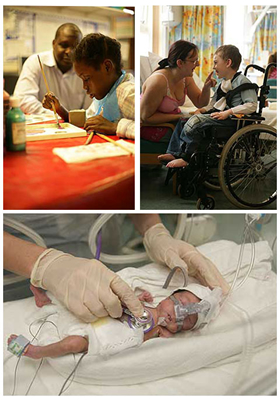Introduction to the Healthy Child Programme course


This session traces the history of the development of the current healthy child programme (pregnancy to five years old) and outlines its main aims and programme components: screening, immunisation, health promotion and behaviour change and parenting support.
The session also describes the philosophical change in approach from child health surveillance and the current policy context.
Learning objectivesBy the end of this session you will be able to:
- Describe the history of the development of the current child health promotion programme in England
- List the desired outcomes of the programme for infants, children and families
- Outline the main activities of the programme, organised by the first 5 years of life
- Describe the current philosophy and approaches to the delivery of the Healthy Child Programme
- Describe the policy context of the Healthy Child Programme
The Healthy Child Programme (HCP) 0-5 years is an evidence-based programme that focuses on pregnancy and the first 5 years of life. It consists of several modules covering a wide range of relevant topic areas.
Prof. Mitch Blair [MBBS, BSc (hons), MSc., FRCP, FRCPCH, FHEA, FFPH (hon)] qualified in medicine MBBS from UCH, London in 1983 with a BSc in Sociology and Philosophy of Medicine and went on to paediatric training posts at Stoke Mandeville, Charing Cross Hospital, Great Ormond Street, Northwick Park, and Nottingham. After obtaining an MSc in Community Paediatrics from the Institute of Child Health in London, he moved to Nottingham as Lecturer and then Consultant Senior Lecturer in Community Paediatrics which he held between 1990 and 1998. He worked in inner city community practice in health centres, schools, day nurseries and specialist out-reach to single handed and group practices. He carried out teaching and research into the national child health screening programme and community paediatric out reach to primary care.
Mitch moved back to London in 1998 and is currently Consultant and Reader in Paediatrics and Child Public Health at Imperial College London, and established the River Island Academic Centre for Paediatrics and Child Public Health Teaching and Research at Northwick Park Hospital, Harrow. His research interests include complementary medicines use in children, international child health indicators, child public health monitoring, and health service evaluation. He was former academic convenor of the British Association of Community Child Health and chair of the Royal College of Paediatrics and Child Health Interprofessional forum on Child Health Informatics. He was Director of Research and Development for North West London Hospitals NHS Trust from 1998-2004 and is currently Fellow of the Royal College of Physicians, Royal College of Paediatrics and Child Health and the Faculty of Public Health. He chaired the UK Child Public Health Interest Group from 2003-2008 and is principle author of the first text book on the subject. He is one of a handful of UK members of the APA and is an Honorary Fellow of the American Pediatric Society in the USA. He was seconded part-time to the DH to advise on the Healthy Child Programme in 2009/10.
His wife Susan is a nurse counsellor in a drug addiction centre and they have two teen children Nathan and Alecia. In what time is left he enjoys water colour, playing jazz clarinet and cycling.


- End of Life Care | Specialist care | Heart failure...
- Posted By eIntegrity Healthcare e-Learning
- Posted Date: 2025-01-10
- Location:Online
- This session has been written by a multidisciplinary group of cardiology and palliative care specialists to help palliative care clinicians become more confident with managing patients with heart failure and knowing when to liaise with heart failure servi
- End of Life Care | Specialist care | End-of-life c...
- Posted By eIntegrity Healthcare e-Learning
- Posted Date: 2025-01-10
- Location:Online
- This session explores the issues presented by end-of-life care in the context of homelessness. The scenario used in the session reflects the complexities that usually exist when caring for a people experiencing homelessness. This session was reviewed by W
- End of Life Care | Spiritual care | Understanding ...
- Posted By eIntegrity Healthcare e-Learning
- Posted Date: 2025-01-10
- Location:Online
- This session considers the meaning of spiritual need and distress. It also addresses how to assess the spiritual needs of those receiving end-of-life care, and when and how this can be achieved. This session was reviewed by Andrew Martin and Richard Kitch
- End of Life Care | Spiritual care | Spirituality i...
- Posted By eIntegrity Healthcare e-Learning
- Posted Date: 2025-01-10
- Location:Online
- This session explores how collaboration with the local community can help services ensure that spiritual care reaches all the people in end of life care who could benefit from it. This session was reviewed by Rebecca Whiting and Sarah Hanrott and last upd
- End of Life Care | Spiritual care | Spirituality a...
- Posted By eIntegrity Healthcare e-Learning
- Posted Date: 2025-01-10
- Location:Online
- This session will look at what health and social care professionals mean when they talk about 'spirituality' and outline how this understanding is central to the philosophy of end-of-life care. This session was reviewed by Simon Betteridge and Richard K







